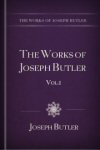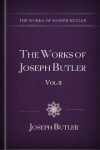The Works of Joseph Butler (2 vols.)
Digital Logos Edition
Overview
Joseph Butler is best known for his contributions to religious philosophy and Christian apologetics. His profound spiritual insight coupled with his vast knowledge of earthly wisdom helped him grapple with the complex philosophical issues of his time. He explored questions of human nature and morality, using them as a basis for establishing our apparent design. A well-known Anglican preacher, Butler laid the foundation for William Paley’s watchmaker analogy.
With the Logos edition of The Works of Joseph Butler, these powerful writings automatically integrate intoyour Logos library, allowing you to cross-reference them and study Butler’s apologetics like never before. All references to Scripture are tagged and appear in your favorite translation on mouseover.
Key Features
- Joseph Butler’s most popular contributions to apologetics
- Indexes to each volume and a detailed appendix for the second volume
- Notes from the editor to help explain and illustrate the texts
Praise for the Print Edition
The design of the Bishop in this work . . . may justly be styled one of the noblest offsprings of the human mind . . .
—Baptist Magazine and Literary Review
. . . the most profound and unanswerable dissertation on natural and revealed religion, in human language.
—The Merchant’s Magazine and Commercial Review
I have derived greater aid from the views and reasonings of Bishop Butler, than I have been able to find besides in the whole range of our extant authorship.
—Dr. Thomas Chalmers, minister, professor of theology, economist, and a leader of the Church of Scotland
The most original and profound work extant in any language on the philosophy of religion.
—Sir James Mackintosh, Scottish jurist, politician, historian, judge, professor and politician
The most argumentative and philosophical defense of Christianity ever submitted to the world.
—Lord Henry Brougham, Lord Chancellor of Great Britain and founder of the Edinburgh Review
Individual Titles

This book contains Butler’s famous work, The Analogy of Religion: Natural and Revealed to the Constitution and Course of Nature. Butler discusses his evidence for Christianity, as well as the concept of humanity in relation to the world and God’s government. Each chapter is a defense or a counterpoint given to commend Christianity to the world of philosophy and logic. Also included in this text are Butler’s dissertations entitled “Of Personal Identity” and “Of the Nature of Virtue,”as well as a correspondence with his adversary Dr. Clarke and an index.

This book contains Butler’s other well-known publication, Fifteen Sermons, as well as “Six Sermons Preached upon Public Occasions,” “A Charge to the Clergy of the Diocese of Durham,” an appendix, and an index. The 15 sermons in the first part of this text are on different topics, including human nature and the moral agency of man, compassion, and piety. The six sermons preached in public are each listed with the context in which they were preached.
Product Details
- Title: The Works of Joseph Butler
- Author: Joseph Butler
- Editor: W. E. Gladstone
- Publisher: Clarendon Press
- Volumes: 2
- Pages: 771
About Joseph Butler
Joseph Butler (1692–1752) was an English bishop, theologian, apologist, and philosopher. He was highly influential to philosophers, including David Hume, Thomas Reid, and Adam Smith. In 1736 Butler became the head chaplain of Queen Caroline. He is praised as an excellent man and church leader.
About W. E. Gladstone
William Ewart Gladstone (1809–1898) served four separate terms as Prime Minister of Britain. He was educated at Eton College before attending Christ Church at Oxford. As president of the Oxford Union debating society, he gained a reputation for his public speaking skills. Throughout his lifetime, Gladstone published over 100 works, including many contributions to religious literature. His first book was The State in its Relations with the Church. His supporters referred to him as “The People’s William” and “Grand Old Man.”

This title is included in the following collections
You can save when you purchase this product as part of a collection.
Logos 6 Anglican Gold Legacy L...
$849.99$849.99Logos 5 Anglican Gold Legacy L...
$849.99$849.99Logos 6 Anglican Platinum Lega...
$1,499.99$1,499.99Logos 5 Anglican Platinum Lega...
$1,499.99$1,499.99
- $2,999.99
- $2,999.99
- $2,999.99
- $2,999.99
- $2,999.99
- $4,749.99
- $4,749.99
- $4,749.99
- $4,749.99
- $21,749.99
- $24,999.99
Reviews
3 ratings

M. David Johnson
3/27/2015
AeliusCicero
6/19/2014

Larry Proffitt (I
5/29/2014